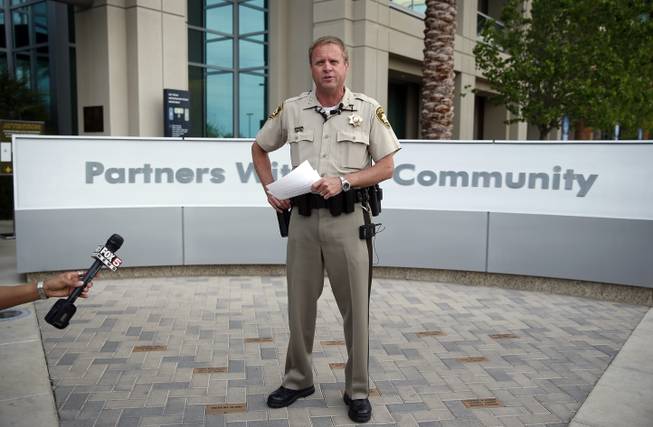
AP Photo/John Locher
Metro Police Undersheriff Kevin McMahill speaks during a news conference, Tuesday, March 17, 2015, in Las Vegas. McMahill spoke about Metro Officer Richard Scavone, who is being charged with misdemeanor battery after a woman was injured when he confronted her with questions about whether she was loitering for prostitution.
Friday, March 20, 2015 | 2 a.m.
A move by local prosecutors to charge a camera-toting officer with using excessive force against a suspected prostitute has thrust Las Vegas into uncharted territory as criminal justice experts test the merits of this new technology.
Metro Police has only been experimenting with body-worn cameras for about six months, yet an eight-year veteran of the force has already become one of the first officers in the country to face criminal punishment for bad behavior recorded while wearing a body-worn camera. Experts say more cases like that of Officer Richard Scavone will likely emerge as the tool’s popularity grows, and that will help researchers better understand the effect cameras have on interactions between police and the public.
“There are close to 1 million officers in the United States, and some small portion of those police officers are not very good at their job,” said Michael White, a professor at Arizona State University who specializes in police technology and officer misconduct. “That will eventually come out, and with an increasing number of officers wearing cameras, it’s going to show who the good officers are and who (aren’t).”
In the wake of two controversial deaths involving officers in Missouri and New York this year, officials nationwide are considering more than 87 pieces of body camera legislation in 29 states with hopes that the new technology will improve relationships between police and the communities they serve. One such bill in Nevada calls for all officers in the state to wear the gadgets. Researchers, meanwhile, have called for restraint as agencies scramble to equip their ranks because little is known about the gadgets’ impact.
Cases like Scavone’s are beginning to shed some light:
Experts say policing is stressful, and officers can lose their temper even while knowingly wearing cameras.
Scavone was among 200 Metro officers who volunteered to wear a camera as part of a federally sponsored study for the gadgets.
Across the nation, at least two other officers have been fired for misconduct related to body cameras: One in Phoenix was videotaped making crass comments while voluntarily wearing a camera, while another in Albuquerque was fired for turning off his device shortly before a fatal police shooting.
While officials have hoped that the cameras will have a so-called “civilizing” effect on police and the people they interact with, White says that behavior can easily change over time as the novelty of the cameras fades.
Proponents say the officers’ punishment bolsters the argument that video footage holds police more accountable for their actions.
“In a sense, this is somewhat of a poster child for how body cameras can help document instances of officer misconduct,” said Samuel Walker, emeritus professor of criminal justice at the University of Nebraska at Omaha.
Heads of police across the country are embracing the cameras as “an olive branch” to communities and show them they have nothing to hide, White said.
The gadgets are presenting an opportunity for police agencies to rebuild community relationships where trust is lacking.
Departments can also use footage to train officers with real-life examples of good and bad interactions with the public.
Scavone’s case could help Metro officials more clearly define unacceptable behavior and use the case to train their ranks, said Chip Coldren, a researcher with CNA Corp.’s Institute for Public Research, a Virginia-based firm that is leading the Metro camera study.
It could also offer examples of best practices.
Metro officials this week were quick to point to more than two dozen instances in which camera footage quashed allegations of officer misconduct.
“It seems to me that not just in Las Vegas but in other jurisdictions more officers have been exonerated as a result of having a body camera,” said Bill Sousa, a UNLV researcher who is helping assess the camera study. “I think officers are very knowledgeable on how it can affect them in both ways.”

Join the Discussion:
Check this out for a full explanation of our conversion to the LiveFyre commenting system and instructions on how to sign up for an account.
Full comments policy